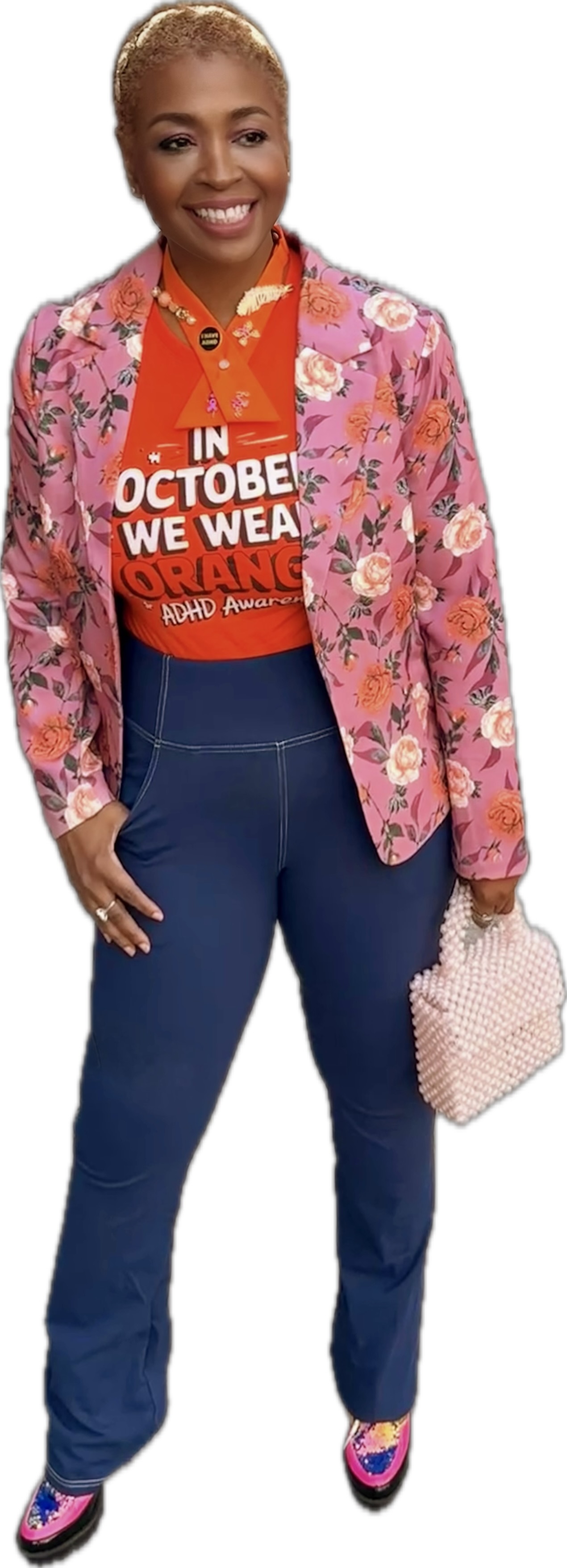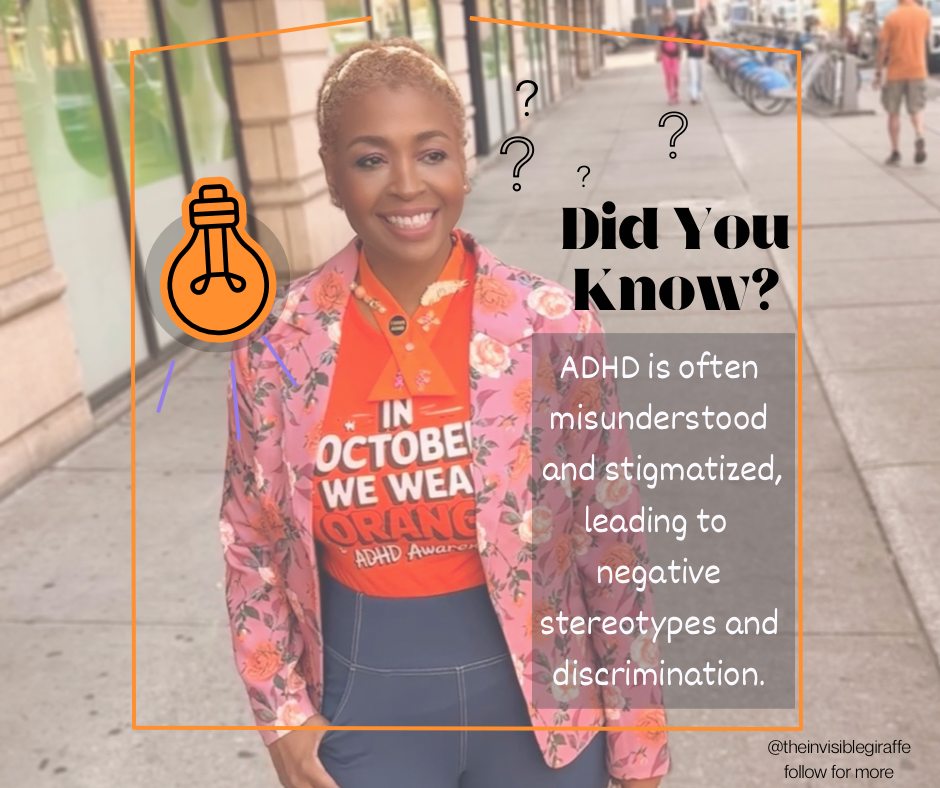Why Survivor is the wrong label for adults with ADHD 🥺


I’m Not a Survivor. I’m a Thriver — Living Loud with ADHD
It started as one of those casual, “girl-talk-but-getting-deep” phone calls — the kind where you start with hair and end up unpacking life.
I’d just finished explaining the thought behind my outfit honoring October’s three awareness causes — orange for ADHD, pink for breast cancer, purple for domestic violence — and I’d texted her pics, because orchestrating those colors without looking like a candy aisle? That’s an art. She’s a breast cancer survivor, and she knows I live with ADHD, so it felt personal for both of us.
A few minutes later, she sent a flyer for an event she’s hosting. The headline read:
“I Survived — What have you survived, and how has it changed you?”
Underneath were prompts: divorce, sickness, suicide, drug addiction, near death, and mental illness.
Then she said: “You know, Marquesa… you’re a survivor too. ADHD is a mental illness.”
For a second, I didn’t say anything. You ever have that freeze-frame moment when your brain goes, Wait — did she really just say that?
I love my friend. I respect her journey. But in that instant, I felt my reality being folded into a category that didn’t fit. Not because ADHD isn’t a mental health condition — it is — but because “survivor” wasn’t the word for my life. I’m not here because I didn’t die. I’m here because I learned how to live differently — loudly, strategically, joyfully — with a brain that doesn’t play by the usual rules.
That conversation is why I wrote this…

What Is Mental Illness, Really?
Mental illness is a clinically significant condition that affects thinking, mood, or behavior — including anxiety, depression, bipolar disorder, and yes, ADHD. ADHD sits under that umbrella and is also a neurodevelopmental difference. It isn’t something you “beat” and move past — it’s how some of us are wired.
We don’t “survive” ADHD — we manage, adapt, and master it every day.
My Diagnosis Changed Everything
Being diagnosed four years ago explained why I could excel on global stages yet struggle with daily routines. I took hundreds of courses and devoured time-management books, but most systems never stuck. I was forcing neurotypical methods onto a neurodivergent brain.
Now, I design systems built for my wiring — and that shift turned exhaustion into sustainable success.

Why “Survivor” Is the Wrong Label
1) We’re born with it — there’s no cure.
ADHD is lifelong. Medication, therapy, and strategy help us manage — there’s no finish line.
2) Stigma is real — especially in Black communities.
Framing us as “survivors” implies we must hide until we’re “fixed.” We deserve to be seen while living with it.
3) Misinformation blocks healing.
“We all have a little ADHD” minimizes clinical realities and keeps people from seeking help.
4) Medication shaming harms.
For many, meds mean clarity, safety, and peace. Shaming adds guilt to an already heavy load.
5) When we share, please listen.
If our story resonates, seek a professional assessment. Otherwise, honor our lived experience instead of flattening it.

We Are Thrivers — Not Survivors
We’re not “lucky to be alive.” We’re brave enough to live differently. We navigate a world not built for our wiring and still find ways to love, lead, and light up every room we enter.
No, I’m not a survivor. I’m a thriver.
Share this post to support ADHD Awareness Month. 💛

Understanding ADHD and Mental Illness
Use this section as a public resource for awareness, empathy, and accuracy — share it with your community, teams, and loved ones.
💭 1. Definition of Mental Illness
Mental illness is a clinically significant disturbance in thinking, feeling, behavior, or mood that affects day-to-day functioning. It includes:
- Depression
- Anxiety disorders
- Bipolar disorder
- Schizophrenia
- Neurodevelopmental disorders like ADHD
ADHD is medically classified as a neurodevelopmental disorder under the umbrella of mental illness (DSM-5). That does not mean character flaw or weakness — it reflects a difference in brain wiring (focus, impulse control, executive function), not a moral failing.
🧠 2. Is ADHD a Mental Illness?
✅ Clinically, yes. 🧩 Socially and experientially, it’s nuanced.
ADHD isn’t “crazy,” “unstable,” or “broken.” It’s a neurological difference impacting attention, organization, emotional regulation, and energy. While it sits under the mental-illness umbrella, many prefer neurodivergence or brain-based condition to reduce stigma.
Calling ADHD adults “survivors” misses the point. We’re not surviving — we’re managing, adapting, innovating, and thriving through it.
💗 3. October Awareness: Three Different Realities
| Awareness | Type | Core Experience | Common Misconception |
|---|---|---|---|
| Breast Cancer Awareness Month | Physical illness | Battling or recovering from a life-threatening disease | Survivorship = living after defeating a physical illness |
| Domestic Violence Awareness Month | Trauma-based social issue | Surviving abuse; reclaiming safety & autonomy | Survivorship = escaping danger and rebuilding |
| ADHD Awareness Month | Neurodevelopmental / mental health condition | Managing a lifelong, invisible condition | Not about surviving — navigating, thriving, and being understood |
🚫 4. Why “Survivor” Doesn’t Fit All Three
The word survivor implies escaping or overcoming a life-threatening danger.
- For breast cancer or domestic violence — survival is literal and physical.
- For ADHD — it’s not about “not dying,” it’s about living fully with a brain that works differently.
Using “survivor” for ADHD or mental illness can minimize ongoing lived experience. We’re not here because we “didn’t kill ourselves.” We’re here because we keep showing up through rejection sensitivity, executive dysfunction, hyperfocus, and shame — and still lead, create, and love.
💬 5. When Someone “Nicely Insults” Your Lived Experience
Listening to respond ≠ listening to understand. “I struggle with that too” can erase the difference between inconvenience and diagnosis.
- They may have focus challenges.
- You live with ADHD — clinically diagnosed and medically managed.
- Both can be true, but only one requires clinical care, accommodations, and lifelong strategy.
It’s not arrogance — it’s accuracy.
🌟 6. The Empowered Reframe
“ADHD doesn’t make me a survivor. It makes me a strategist — every day I build systems to thrive in a world not designed for my brain. Survivorship means the danger has passed. ADHD means the work continues — with strength, structure, and self-compassion.”
About Marquesa Pettway — The Zoom Queen 👑
Marquesa Pettway, CSP, is a former CNN Producer turned VirtualBizPreneur Creator and smart technology speaker helping professionals master leveraging smart technology in their business through SmartTech systems and tools and Zoom Enterprise.
Diagnosed with ADHD in her early 50s, Marquesa turned what once felt like “being uncomfortably different” to “being uniquely wired”—and now she’s empowering others to do the same with her keynotes and her upcoming book #TheInvisibleGiraffe.
She’s the founder of VirtualBiz.Club — a global membership community for business owners who want to leverage the Zoom platform and become profitable VirtualBizPreneurs.
💡 In her upcoming membership group debut, Visionaries Digital Planning, launching this year, she will share how to strategically plan in the digital world.
Join VirtualBiz.Club Learn Zoom + SmartTech
Https://www.SheLovesDigitalPlanning.com

🧠 Further Reading: How ADHD Differs from Neurotypical Wiring
Meta-analysis of Structural & Functional Alterations (2023)
Large-scale MRI review showing how ADHD brains differ in grey matter and connectivity — proving ADHD isn’t “just a focus issue.”
Read on PubMed →The Brain Anatomy of ADHD (2019)
Landmark NIH study showing structural and functional brain differences across ages — one of the most-cited ADHD imaging papers.
Read on NIH →ADHD Brain vs Normal Brain
Clear, everyday breakdown of how ADHD brains differ in neurotransmitters and executive-function pathways — perfect for general readers.
Read on Medical News Today →Face It — People with ADHD Are Wired Differently
ADDitude Magazine explains the science and the lived experience — a relatable, empowering piece for your audience.
Read on ADDitude →Is the ADHD Brain Wired Differently? (Review)
Comprehensive neuroscience review showing differences in default-mode and fronto-striatal networks — the core of ADHD’s unique wiring.
Read on PMC →In Person, Virtual, the Connection can be
t+ The Best, Hottest, Results-Driven, Technology resources delivered to your inbox.
We hate SPAM. We will never sell your information, for any reason.


